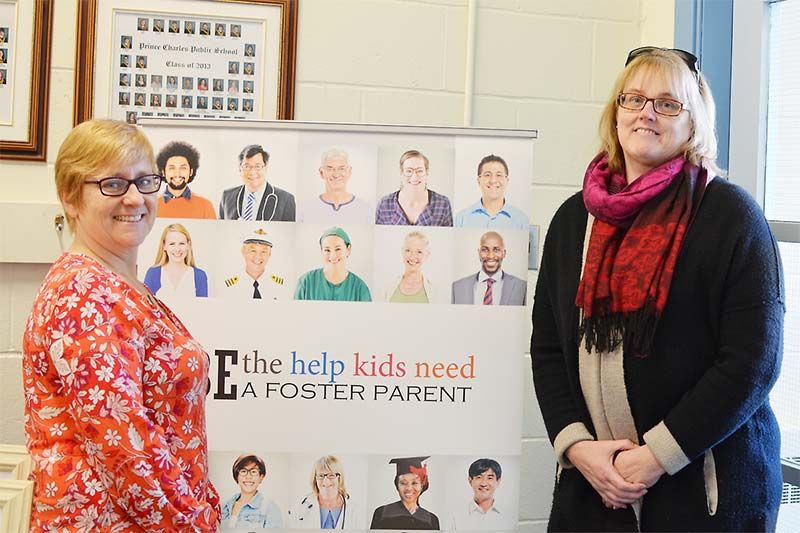Jeff Green | Dec 14, 2016
There was a broad array of hand crafted gifts, late season produce, fresh baking, sweet cider and peroghi’s for the holidays that were Charles Public School last Saturday (December 10).
While many were taken with the fact that a winery, Three Dog Winery from Prince Edward County, was on hand as the result of changes in regulations permitting Ontario beer, cider and wine producers access to farmer’s markets, there was another unusual display. Just off the gym near the north exit, Family and Children’s Services of Frontenac and Lennox and Addington (FACSFLA) – formerly known as the Childran’s Aide Society, had two senior managers on hand to talk about fostering and adopting children.
Angela Woodhouse handles recruitment of foster and adoptive families and Mary Margaret Fuller is the Manager of Resource Services, and her team guides families through the process of fostering and adopting.
“We wanted to participate in the Christmas show here because we know a lot of people come out for it,” said Woodhouse, who lives nearby, “and because we thought Christmas is a time when people think about family and community and the roles each play in people’s lives.”
Mary Margaret Fuller said that the reason FACSFLA wanted to come out to Verona in particular was that there is a need for rural families for certain foster children who are either from the area or are looking to get out of the city to be able to participate in more outdoor activities.
There are currently 25 children, most of them in the middle to older age range of 12 years and up, that FACSLA is looking to place in foster or adoptive homes at the moment.
She also said that FACSFLA has worked very hard in recent years to make sure that before any child is fostered that all avenues for family reconciliation have been explored.
“We work with families and with extended families to keep children in place or with kin, but when that is not possible we look for foster families,” she said.
FACSFLA has produced a somewat tongue in cheek “15 reasons to foster” teens as part of their recruitment campaign, which is aimed at families in the midst of their chld rearing years and also at “empty nesters” who have the time, space and inclination to live with young people again.
The list points out that “no diapers are required” and that “teens sleep through the night” and “will tell you when your old clothes are back in style”. It also offer added bonuses such as “You can teach teens to drive” and “Every kid deserves a family to rebel against” and finally “Goodbye Dora the Explorer and hello Walking Dead!”
Fostering is a serious pursuit, of course, and the process of becoming a foster family takes a year, and requires training.
The process starts when an individual or family contacts FACSLFA to express interest in fostering. This is followed by a meeting with a resource worker who lays out all of the details about how to become a foster parent, what expectations and supports there are.
This is followed by two concurrent courses. On is Parent Resources for Information, Development and Education (PRIDE) a provincial training program delivered locally over 10 three hour sessions. The other is called Structured Analysis Family Evaluation (SAFE), set of tools that are used to determine eligibility, suitability, and readiness. It takes about 10 hours of meetings to complete.
Once the entire process is completed, which can take six months or longer, efforts are made to make the best match between children with families. Heritage elements such as an indigenous background are important factors, and that is one of the reasons why FACSFLA is looking to southern and northern parts of Frontenac County for new foster families.
“Fostering is not the ideal solution for children, but good fostering is vey important to us, for the children and the foster families,” said Angela Woodhouse.
On their website, FACSFLA outlines how fostering fits into the vision that the agency has been developing over the last 4 years.
“On this journey, foster care is a temporary stop along the way. We will try to find a way for them to return home or to live with extended family. If those aren’t options, then we will find them an adoptive family. Our new vision will see foster parents take on the role of adoptive parents if and when a child needs them. This is our vision. Our goal is to give every child the permanency they deserve.”
FACSLFA has about 200 children in care, a number that has been on a steady decline as the results of efforts to maintain children with their birth families whenever possible.
Of those 79% are over 12 years old. In the near future, however, the numbers could rise substantially as the Ontario government considers upping the age where agencies like FACSLFA have jurisdiction from 16 to 18.
More Stories
- Grace Centre Project Nears Completion
- Krista Williams and a Promise Maid
- Opportunities Available in Ontario’s Energy Landscape
- Barb Sproule Retires from North Frontenac role after 44 years
- Central Frontenac Questions Ownership Streetlight
- 1st anniversary celebration at Back to Health in Inverary
- Melvin Jones Award Goes to Lois Emond
- Frontenac Farmer’s Market Set to Open for 2024
- Harrowsmith Public School and the Magic of Theatre
- You’re a Good Man Charlie Brown – a school wide effort at SHS

